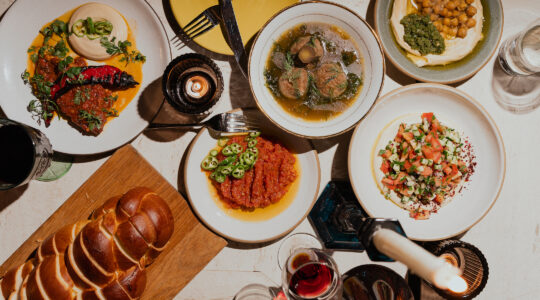
For me, one of the best things about being in Israel is shopping for food. It is an entirely different experience from grocery shopping in the States, with options from small specialty stores to fancier “American” oriented grocery stores, to seriously large Israeli supermarkets, fruit & vegetable stands, mini markets (which are actually called that and spelled out in Hebrew), and of course Mahane Yehuda, the revived open air market in downtown Jerusalem, where there are 8-10 blocks filled with stalls, and shops, and cafes. Even the little café in a shack at our corner park sells fresh tomatoes and cucumbers.
There are multiple parts to shopping here – the first, deciding what’s on your list. And you definitely need one. I am often side-tracked by beautiful produce or a cheese I haven’t yet tried, a giant Jerusalem kugel that you can buy by the slice, more burekas of every kind and pastries filled with warm and oozing chocolate than you can imagine, and of course the unbelievably fragrant spices that call out to be put on something… Without a list, you’re bound to get a lot of great items but not necessarily what you may need for a meal or even for a specific dish. Not that you shouldn’t take advantage of the local bounty – or ideas passed along in the market – indeed you should; just figure out how it factors into everything else you’re planning.[[READMORE]]
At a recent Shabbat lunch I served some fabulous zucchini fritters. These were the result of a visit to a spice vendor in Mahane Yehuda who was selling what he called a “doughnut mixture” which included an unspecified mixture of breadcrumbs and spices. Since he had samples and they were indeed delicious, I bought a bag. The vendor then slapped on an instruction label (printed in English/Hebrew/and Arabic) telling you to add eggs and water or instead of water shredded zucchini to give it moisture and whatever other vegetables you liked. (Note – no ingredients nor nutrition counts on this bag.) I chose zucchini and served them warm with a crumbled sheep’s milk feta and parsley on top – delicious!
The second challenge to shopping here is infrastructure. Back home I have 66” of stainless steel refrigerator and freezer just waiting to be filled (in fact, my main kitchen fridge is so big that it’s commonly the source of admiration, with many people feeling compelled to look inside). Suffice it to say – I can hold a LOT of food. And then there’s the extra fridge in the basement. Here in Israel – one regular sized fridge/freezer combo. My kitchen back home – huge with a giant walk-in pantry. Here – basically 2 cabinets. So, buying a lot of food at once is generally a bad idea. That does give me leeway, though, to shop regularly for food, which I never seem to mind.
And while originally, the 3rd floor walk-up where we’re living was a bit of a hurdle, I quickly learned about “mishloach.” While I knew the word from Purim, where we deliver Mishloach Manot to friends and family, here it’s even better than candy and hamantaschen – it means delivery! For a small fee (of roughly five dollars but often based on the size of your purchase) most any grocery store will deliver to your door. But generally not in the afternoons before Shabbat and holidays, nor any evenings. So, be careful here and make sure you ask before you check out. I recently had a harrowing experience when I checked out with a rather full cart and found that this one big, out-of-the-way store did not have mishloach and I did not have a car! Thank god for Steve, who graciously came in a cab to get me and all my groceries. Anyway, they shouldn’t call it “mishloach,;” they should call it “mechaya,” Yiddish for a relief or pleasure. It is.
Stay tuned for upcoming posts on the different markets I’m finding and more adventures in shopping.
And finally, there’s the heat. All of Israel has been unusually hot this year. And who wants to spend time slaving over a hot stove when it’s unbelievably uncomfortable and sticky outside, with the late afternoon sun beating down directly into the kitchen and raising the temperature at least another few degrees? So salads have been a good option. I’ve included a recipe for a salad I’ve been eating a lot that I came up with after purchasing a small bottle of Pomegranate syrup in a mini-market. This salad is seasonal, refreshing, beautiful and delicious and would fit right in with any Sukkot menu or fall meal.
Pomegranate/Apple Salad
For the salad:
1 bag/box mixed baby greens
1 green apple
1 fennel bulb
1 pomegranate or fresh pomegranate seeds
For the dressing:
3 tablespoons pomegranate syrup
3 tablespoons apple juice concentrate (defrosted)
1 small shallot – finely minced
1/2 cup oil – either olive or walnut
1/2 lemon
salt & pepper
Wash and dry the mixed greens. Core and quarter the green apple and then cut each quarter into thin slices and place them over the greens in a salad bowl. If you are making this ahead of time, you may want to soak the apples in lemon water until you are ready to serve. Slice the fennel bulb in half and then cut into thin slices and add them to the salad. Finally, sprinkle pomegranate seeds over the salad. In some places you can find the seeds ready-to-use; otherwise, you’ll have to separate the seeds from a whole pomegranate. Toss with the dressing and serve immediately.
For the dressing – in a small bowl – mix together the pomegranate syrup and apple juice concentrate until it is combined and smooth. Mix in the shallot. Slowly add the oil, whisking vigorously until the dressing comes together. Squeeze the juice from the lemon and add to the dressing. Add a pinch of salt and pepper and mix. Adjust as necessary – if the dressing is a little tart add some more pomegranate syrup and concentrate, if it’s too sweet add additional lemon juice.
JTA has documented Jewish history in real-time for over a century. Keep our journalism strong by joining us in supporting independent, award-winning reporting.





